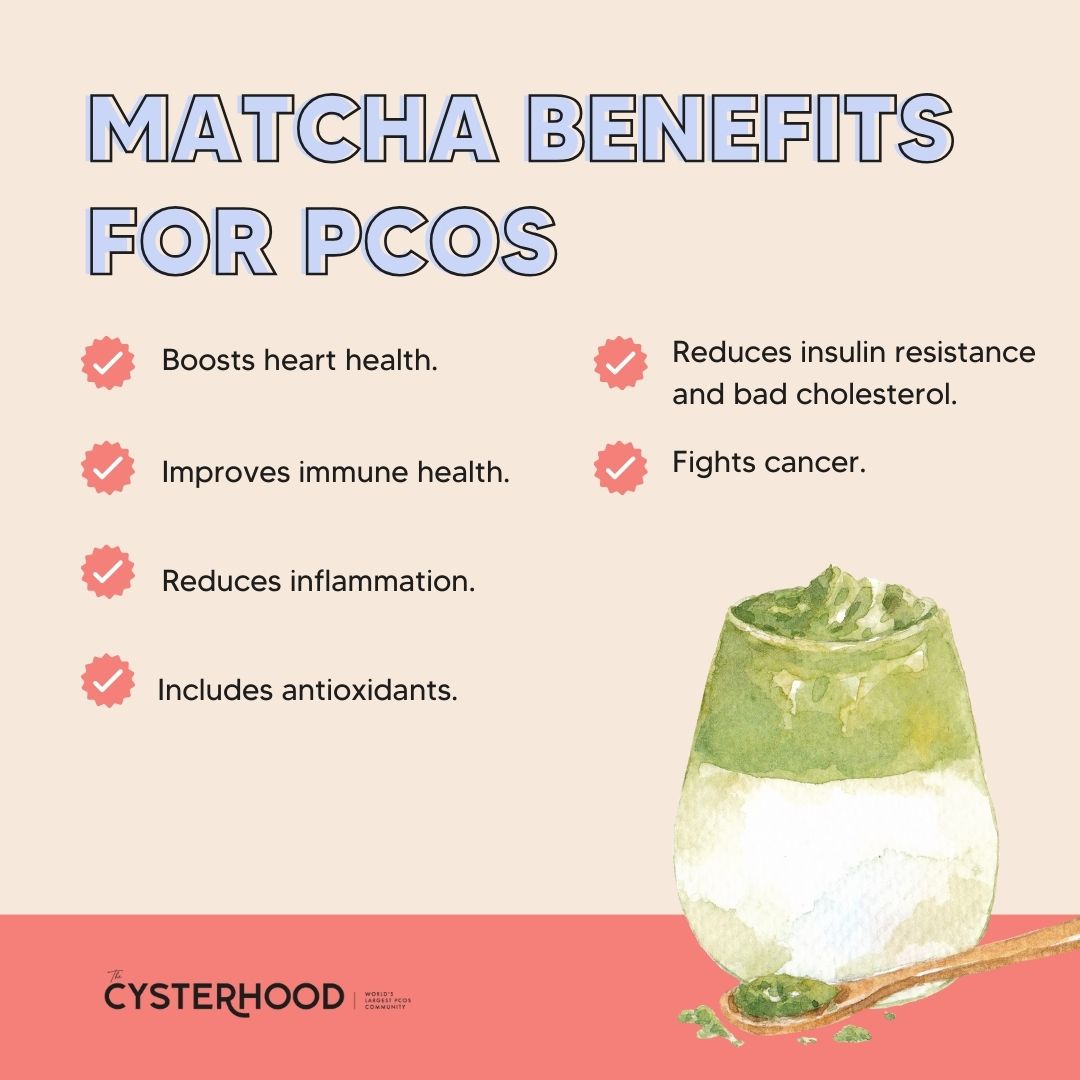Yes, Matcha tea can be beneficial for managing PCOS symptoms. The antioxidants and nutrients in Matcha tea may help with hormone balance and insulin sensitivity.
Polycystic Ovary Syndrome (PCOS) affects many women worldwide. Managing PCOS symptoms can be challenging, and many look for natural remedies. Matcha tea, a finely ground green tea powder, has gained popularity for its potential health benefits. Rich in antioxidants and nutrients, Matcha tea might offer support for those with PCOS.
It can help improve hormone balance and insulin sensitivity, which are crucial in managing PCOS. In this blog, we will explore the benefits of Matcha tea for PCOS and how it may be a helpful addition to your wellness routine. Stay tuned to learn more about this vibrant green tea and its potential health benefits.

Credit: bebalancednutritionrd.com
Introduction To Matcha Tea
Matcha tea, a type of green tea, has gained popularity for its many health benefits. It stands out due to its unique preparation and rich nutritional profile. For those with PCOS, understanding its benefits can be particularly valuable.
Origins And History
Matcha has a long and storied history. Originating in China, it was later popularized in Japan. The Japanese tea ceremony, known as chanoyu, celebrates the meditative and aesthetic qualities of matcha. Its cultivation and production methods have been refined over centuries, contributing to its high quality.
Nutritional Profile
Matcha is rich in nutrients that can support overall health. Here’s a quick look at its key components:
| Nutrient | Benefits |
|---|---|
| Antioxidants | Help fight free radicals |
| Chlorophyll | Detoxifies the body |
| Fiber | Supports digestive health |
| EGCG | Boosts metabolism |
| L-theanine | Promotes relaxation |
The antioxidants in matcha can help reduce oxidative stress, which is beneficial for managing PCOS symptoms. The presence of EGCG (epigallocatechin gallate) can aid in weight management, a common concern for those with PCOS. Additionally, L-theanine promotes relaxation and reduces stress levels.
Incorporating matcha into your diet can be a simple yet effective way to support your health, particularly for those dealing with PCOS. Its unique combination of nutrients makes it a valuable addition to a balanced lifestyle.
Understanding Pcos
Polycystic Ovary Syndrome (PCOS) is a common condition in women. It affects hormone levels, leading to irregular periods, acne, and weight gain. PCOS can also cause infertility. Understanding the symptoms and diagnosis is crucial.
Symptoms And Diagnosis
PCOS symptoms vary from person to person. Common signs include:
- Irregular periods
- Excess hair growth
- Acne
- Weight gain
- Thinning hair
Doctors diagnose PCOS using a combination of:
- Medical history
- Physical exam
- Blood tests
- Ultrasound
Early diagnosis helps manage symptoms better.
Common Treatments
PCOS treatment focuses on managing symptoms. Common treatments include:
| Treatment | Description |
|---|---|
| Birth control pills | Regulates hormones and periods |
| Metformin | Improves insulin resistance |
| Clomiphene | Stimulates ovulation |
| Hair removal | Reduces excess hair growth |
| Lifestyle changes | Diet and exercise improve symptoms |
Each treatment has its benefits. Consult a doctor for a personalized plan.
Matcha Tea And Hormonal Balance
Polycystic Ovary Syndrome (PCOS) affects many women worldwide. It’s a hormonal disorder that can lead to various health issues. Balancing hormones is key to managing PCOS. Matcha tea, a finely ground green tea powder, is gaining popularity. But, how does it impact hormonal balance in women with PCOS?
Impact On Insulin Levels
Women with PCOS often have insulin resistance. This means their bodies struggle to use insulin effectively. High insulin levels can lead to increased androgen production, worsening PCOS symptoms. Matcha tea may help lower insulin levels. It contains high levels of antioxidants known as catechins. These antioxidants improve insulin sensitivity. They help the body use insulin more efficiently. Lowering insulin levels can reduce the risk of type 2 diabetes.
Effect On Androgens
Androgens are male hormones that women also produce. High levels of androgens can cause symptoms like acne, hair loss, and irregular periods. Matcha tea can help reduce androgen levels. The antioxidants in matcha tea support hormonal balance. This can help alleviate some PCOS symptoms. Studies suggest that matcha tea’s anti-inflammatory properties also play a role. Reducing inflammation can further help manage androgen levels.
Anti-inflammatory Properties Of Matcha
Many women with PCOS struggle with inflammation. Matcha tea, made from green tea leaves, can help. This tea has strong anti-inflammatory properties. It may reduce inflammation in the body and improve overall health.
Reducing Chronic Inflammation
Chronic inflammation is common in PCOS. It can cause many health problems. Matcha tea has natural compounds that fight inflammation. Drinking matcha regularly may help lower inflammation levels.
One of these compounds is EGCG (Epigallocatechin Gallate). EGCG is a type of catechin, a powerful antioxidant. It can reduce inflammation and support your immune system. Including matcha in your diet may help manage PCOS symptoms.
Antioxidant Benefits
Antioxidants protect your body from damage. They fight free radicals, which cause inflammation and aging. Matcha tea is rich in antioxidants. It has more antioxidants than regular green tea.
Here is a comparison of antioxidant levels in different teas:
| Type of Tea | Antioxidant Level |
|---|---|
| Matcha Tea | High |
| Green Tea | Medium |
| Black Tea | Low |
The high antioxidant content in matcha can help reduce inflammation. It can also improve your skin and overall health. Drinking matcha can be a simple, natural way to manage PCOS symptoms.
Matcha Tea For Weight Management
Polycystic Ovary Syndrome (PCOS) can make weight management difficult. Many people with PCOS struggle to maintain a healthy weight. Matcha tea may help in this journey. Let’s explore how matcha tea can support weight management, especially for those with PCOS.
Boosting Metabolism
Matcha tea is rich in catechins, especially EGCG (Epigallocatechin Gallate). EGCG is known to boost metabolism. A higher metabolism means your body burns calories faster, even when at rest.
Studies have shown that drinking matcha tea can increase thermogenesis. Thermogenesis is the process through which your body generates heat by burning calories. This process helps in weight loss, which is crucial for managing PCOS symptoms.
Enhancing Fat Burning
Matcha tea not only boosts metabolism but also enhances fat burning. The combination of caffeine and catechins in matcha can improve the body’s ability to burn fat. This is especially helpful for those with PCOS, who often find it hard to lose weight.
Drinking matcha tea before exercise can enhance fat oxidation. This means your body uses more fat as fuel during physical activities. This can lead to more effective weight loss and better management of PCOS.

Credit: bebalancednutritionrd.com
Stress Reduction With Matcha
Matcha tea is known for its numerous health benefits. One of the most significant advantages is its ability to reduce stress. This is especially beneficial for women dealing with Polycystic Ovary Syndrome (PCOS). Matcha contains unique compounds that promote relaxation and mental clarity. Let’s explore how it helps in stress reduction.
L-theanine And Relaxation
Matcha tea is rich in L-Theanine, an amino acid that promotes relaxation. This compound helps calm the mind without causing drowsiness. Women with PCOS often experience high stress levels, making relaxation challenging. The presence of L-Theanine in matcha tea can help alleviate this.
L-Theanine works by increasing the production of alpha waves in the brain. Alpha waves are associated with a state of relaxed wakefulness. This leads to a reduction in stress levels and an improvement in overall well-being.
Improving Mental Clarity
Besides promoting relaxation, matcha tea enhances mental clarity. PCOS can lead to brain fog, making it difficult to focus. The combination of L-Theanine and caffeine in matcha tea can improve concentration and alertness.
This unique blend provides a steady energy boost without the jitters. It also helps in maintaining focus for longer periods. For women with PCOS, better mental clarity can make managing daily tasks easier.
In summary, matcha tea offers a natural way to reduce stress and improve mental clarity. Its unique compounds make it an excellent addition to a PCOS-friendly diet.
Incorporating Matcha Into Your Diet
Matcha tea can be a beneficial addition for those with PCOS. Its rich antioxidants and calming properties may help. How can you add this green tea to your daily routine? Let’s explore some simple ways to include matcha in your diet.
Simple Recipes
Start with a basic matcha latte. Mix one teaspoon of matcha powder with hot water. Add steamed milk and a bit of honey for sweetness. For a cold option, blend matcha powder, ice, and your choice of milk. Smoothies are another easy way. Combine matcha with banana, spinach, and almond milk. You get a nutritious boost.
Want a quick snack? Matcha chia pudding is perfect. Mix chia seeds, almond milk, and a teaspoon of matcha. Let it sit overnight. Enjoy it the next morning. You can also bake with matcha. Add a teaspoon to your pancake or muffin batter. It’s easy and tasty.
Daily Consumption Tips
Moderation is key. Start with one cup a day. Notice how your body reacts. If you feel good, consider adding more. Try to consume matcha in the morning. Its caffeine content can give you a gentle energy boost. Avoid drinking it late in the day. It may interfere with your sleep.
Pair matcha with meals. It can enhance the absorption of nutrients. You can also enjoy it as a mid-morning snack. A matcha latte can be very satisfying. Just remember, balance is important. Listen to your body and adjust as needed.

Credit: pcosweightloss.org
Potential Side Effects
Matcha tea offers many health benefits, but it may have some side effects. Individuals with PCOS should be aware of these potential issues. Understanding these can help make informed choices.
Caffeine Sensitivity
Matcha contains caffeine, which can cause jitters and anxiety. For some, it may disrupt sleep patterns. People sensitive to caffeine should monitor their intake. It is best to start with a small amount.
Allergic Reactions
Though rare, some people may be allergic to matcha. Symptoms include itching, hives, and swelling. If any signs of allergy appear, stop consuming matcha immediately. Consult a healthcare provider if symptoms persist.
Frequently Asked Questions
Is Matcha Tea Good For Pcos?
Yes, matcha tea is good for PCOS. It helps regulate hormones, reduces insulin resistance, and improves metabolism.
How Does Matcha Tea Help With Pcos?
Matcha tea helps with PCOS by balancing hormones, reducing inflammation, and improving insulin sensitivity.
Can Matcha Tea Reduce Pcos Symptoms?
Yes, matcha tea can reduce PCOS symptoms. It helps manage weight, reduces insulin resistance, and improves menstrual regularity.
Is Matcha Tea Safe For Women With Pcos?
Yes, matcha tea is safe for women with PCOS. It is natural, rich in antioxidants, and promotes overall health.
Conclusion
Matcha tea offers potential benefits for those with PCOS. Its antioxidants support health. Regular consumption may help manage symptoms. It’s a natural and nutritious addition to your diet. Always consult your doctor before making changes. A balanced approach is key.
Matcha can be part of a healthy lifestyle. Enjoy it as a soothing daily ritual. Remember, small steps lead to big improvements. Stay informed and take care of your body.







